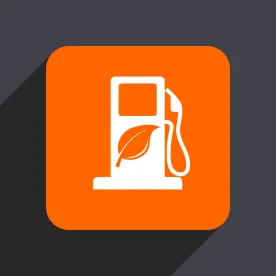After four tries to enact a low carbon fuel standard, Governor Jay Inslee on May 17, 2021, signed HB 1091, new legislation that will establish a Clean Fuels Program (CFP) designed to limit the carbon intensity of transportation fuel in the State of Washington. Washington’s CFP will be linked to existing low carbon fuel standard (LCFS) programs in Oregon and California, creating a West Coast market for biofuels and other low-carbon transportation fuels, as well as a regional market for LCFS carbon reduction credits.
Key Takeaways
Washington’s CFP legislation includes the following major mandates:
-
Greenhouse gas (GHG) emissions from transportation fuels sold in Washington must be 20 percent below 2017 levels by 2038, with specific interim steps ranging from 0.5% to 1.5% per year.
-
The program pauses at a 10% reduction in fuel carbon intensity in 2028 unless there is at least a 15% increase in biofuel production in Washington and plans for at least 60 million gallons of new biofuel production capacity in Washington have been approved.
-
The program also includes a pause in 2031, by which time the Washington Department of Ecology (Ecology) must report to the Joint Legislative Audit and Review Committee and the legislature is given a chance to modify the program, although there is no requirement for the program to be reauthorized.
The Washington Department of Ecology (Ecology) must implement CFP rules that come into force no later than January 1, 2023.
-
Ecology must implement a system of LCFS credits that will allow entities selling transportation fuels that have a carbon intensity below the requirements set forth in the legislation to obtain credits that can be sold to entities that do not meet the carbon intensity requirements.
-
While Governor Jay Inslee signed the provisions described above, he vetoed a provision specifying that the CFP program may not go into effect until the Legislature has enacted a transportation bill that includes an increase of at least five cents per gallon in Washington’s gasoline tax.
The LCFS programs in California and Oregon have created significant demand for ethanol and other biofuels that are blended with petroleum-based transportation fuels to reduce their GHG intensity. Those programs have also generated a robust market for transportation-related credits created by the use of electricity in electric vehicles. The new legislation can be expected to jump-start demand for alternative transportation fuels, including biofuels and electricity, in Washington. In addition, the new CFP legislation, in combination with new legislation extending tax credits to hydrogen-powered vehicles, will usher in new low-carbon or carbon-free transportation technologies like hydrogen fuels.
The Legislation in Detail
HB 1091 contains a number of provisions that could both expand and limit its reach as it is rolled out in future years. These include:
-
GHG Reduction Mandates: The legislation requires a reduction in GHG emissions from transportation fuels sold in Washington of 20 percent by 2038 based on 2017 emissions levels, with specified limits on the step-wise reductions in the GHG intensity of motor fuels between now and 2038. In addition, the legislation mandates that, by the end of 2031, Ecology adopt rules setting permissible GHG levels for transportation fuels that are “consistent with” the state’s general GHG reduction goals set forth in RCW 70A.45.020. In its current form, that statute sets progressively more strict state GHG reduction goals between now and mid-century, culminating in a limit of five million metric tons of GHG emissions in 2050, equivalent to a 90% reduction below the state’s 1990 GHG emissions.
-
Exempt Fuels: The legislation exempts fuels that are sold outside Washington, as well as fuels used in aviation, railroads, and watercraft. It also exempts fuels used in certain military vehicles, and fuels for non-transportation equipment used in agriculture, silviculture, and certain industries. However, if these industries can generate GHG reduction credits, they may voluntarily participate in the program in order to receive credits. In addition, Ecology may exempt other fuels if necessary to align Washington’s CFP with that of other states or to avoid “fuel-shifting,” where high-GHG fuels are sold in unregulated markets to avoid Washington’s CFP.
-
Life-Cycle Carbon Analysis. Ecology is required to adopt rules that measure the GHG intensity of transportation fuels based on life-cycle analysis, which includes factors such as the carbon-intensity of electricity that is used to produce the fuels, and the level of GHG emissions associated with transporting and storing the fuels.
-
Carbon Credits. Washington’s CFP will include a system of credits that can be bought and sold so that entities that do not otherwise meet GHG limits can achieve compliance by purchasing credits from other entities that have generated GHG reductions greater than needed for their own compliance. Credits also can be generated from a variety of sources that produce reductions in the GHG intensity of transportation, including, for example, charging of electric vehicles (including smart charging that allows electric vehicles to be charged at times of high production from renewable generating resources), carbon sequestration projects, electrification of the state ferry fleet, and use of hydrogen fuels. If credits are generated by an industry that is otherwise exempt from the CFP, the legislation permits the producer of such credits to voluntarily register with Washington’s program so that it can sell those credits. The CFP also includes several cost containment tools that limit potential expenses and volatility of the carbon credit market and help ensure that carbon credit prices in Washington align with prices in other states with similar markets.
-
Coordination With Existing Programs: Ecology is directed to adopt rules that harmonize Washington’s CFP with the programs of other states except where harmonization is inconsistent with the Washington statute. This should promote development of region-wide markets for low-carbon fuels and for LCFS credits.
-
Utility Credits and Expenditures: HB 1091 permits electric utilities to participate in the CFP and to obtain credits for supplying retail customers with electricity to power electric vehicles. At least fifty percent of the revenues generated by such credits must be expended to support utility projects that support electrification of transportation, or the utility’s the provision of hydrogen or other non-fossil fuels to transportation, with thirty percent of such revenues expended in disproportionately impacted communities or in areas that do not meet air quality standards. Ecology and the Utilities and Transportation Commission are to jointly develop rules under which some proportion of the remaining 50% of revenues derived from credits are used for incentives to encourage consumers to purchase electric vehicles.
-
Compliance Deferrals and Opportunity for Legislative Refinements: The legislation requires Ecology to issue an order deferring CFP compliance if there is a shortage of low-carbon fuel necessary for CFP compliance that is projected to be greater than five percent of the projected supply. In addition, compliance may be suspended if the Ecology, in consultation with the Governor, issues an emergency declaration. The legislation also includes a provision requiring legislative review of the program after it reaches ten percent implementation and the opportunity for the legislature to modify the program.
-
Contingency Milestones – In-State Biofuels Production Facilities: The legislation also includes provisions that will freeze the compliance standard in 2026 unless there is a 15 percent increase in in-state biofuel production. The standard will be frozen in 2028 unless new biofuel facilities with at least 60 million gallons of production capacity have received all necessary permits. To facilitate siting of projects that would help the state achieve its greenhouse reduction goals, the bill calls on the Department of Ecology, after coordinating with other state agencies and consulting business, community groups, labor, and tribal stakeholders, to identify “suitable” areas for permitting these projects and to develop recommendations for how to improve the permitting process. The legislation also exempts certain biofuel refineries from the jurisdiction of the Energy Facilities Site Evaluation Council.
Outlook
Adoption of CFP legislation in Washington bodes well for the state’s biofuels industry. It also suggests that industries that can create GHG reductions associated with transportation, ranging from fuel suppliers in exempt industries like aviation to electric utilities and broadband providers, may have meaningful opportunity to sell credits into the LCFS market. Because the Washington legislation is designed to integrate into existing LCFS programs in Oregon and California, these markets will cover the entire West Coast. Approximately 20 million vehicles are located in these states, which promises to make this a robust market.







 />i
/>i

